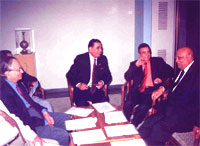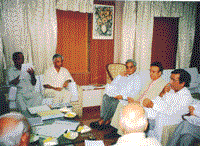|
|
|
|
|
Jury
in Action
|
 |
|
Awards
jury meeting in progress under the chairmanship of
Lord Swaraj Paul
|
|
|
|
From
right : C P Jain, Chairman & MD , NTPC, Pradeep Chaturvedi,
Chairman, Institution of Engineers & Advisor , FAO, A K Khosla,
Advisor, GEC India, Rakesh Bharti Mittal, Vice Chairman & MD,
Bharti Teletech Ltd, Dr Uddesh Kohli, Former CMD, Power Finance
Corporation & Chairman Consultancy Development Center
|
 |
|
Mr.
TKA Nair,IAS,Principal Secy to Prime Minister of India, (Chairman
Awards jury) listening intently to all applications presentation
by Mr Pradeep Chaturvedi, Advisor FAO and Chief Assessor. Also seen
Dr PL Sanjeev reddy, Dr OPChopra, Dean Faculty of Management Studies,
Delhi University, and Dr Madhav Mehra
|
|
|
|
---------------
|
|
8th
World Congress on Environment Management
also presentation of
Golden Peacock Awards
|
|
|
|
---------------
|
|
PAST
WINNERS
|
|
Golden
Peacock Awards
|
|
|
|
|
|
|
National
Training Award (GPNTA) 
|
|
|
|
|
|
|
|
|
|
|
|
|
Press
Articles
GREENING
INDUSTRY - INTERVIEW WITH DR. MEHRA
Times
of India, Delhi Edition
July 14, 2003
|
|
"It
is impossible to evaluate the environment in economic terms.
Can we quantify the financial worth of say, oxygen? We really
don't know the value of a clean environment - air, water,
mountains…"
|
|
He
is a prosperous NRI Londoner whose heart still beats for
Palampur,
his ancestral hometown in Himachal Pradesh. Having spent more
than three decades as a hard-nosed businessman, Madhav Mehra
is now devoted to environmental protection and cleaning up
of industrial practices. The chairman of the World Environment
Foundation (WEF) tells Narayani Ganesh that the only way to
resolve the man environment face-off is to go back to our
tradition, which emphasizes a holistic approach to almost
everything:
|
|
|
|
|
What
brings you to the small town of Palampur?
|
|
Three
years ago, I visited Palampur in Himachal Pradesh after 40
years. I re-discovered the beauty of the place. Within nine
months, in 2001, I constructed a convention centre on the
site of my ancestral home, and was determined to make it the
focus of an annual meet on the importance of living in harmony
with the environment.
|
|
|
| You
had Sri Sri Ravishankar as the keynote speaker at the recently
concluded fifth annual meet of the Global Environmental Foundation.
Why a spiritual head? |
| The
Indian psyche has always respected the environment. Our tradition
tells us to celebrate life through a holistic approach. Sadly,
not many of us heed this advice. It is impossible to evaluate
the environment in economic terms. Can we quantify the financial
worth of say, oxygen? We really don't know the value of a
clean environment-air, water, mountains… By acting in
a way that adversely impacts on environment we are compromising
the future of not just our children but all future generations. |
|
| |
| You
were an industrialist for many years. Don't you think most
of the environmental ills today stem from irresponsible production
processes? |
|
|
Absolutely.
A lot of energy has been wasted. How many countries, for example,
use renewable energy? In the last four years, however, there
has been a tremendous change in perceptions. From exploiters,
industrialists have now become eco-savvy - they realize that
it pays to be emission-conscious. Today, how green you are
is an important component of your market value. According
to the worldwide millennium survey (2000-01), 60 per cent
of all those interviewed said that they would punish companies
if they were found to be emitters or socially unfriendly.
With this increased public awareness, pollution is coming
down, albeit gradually.
|
|
| Can
you give one example of a polluting unit that has now turned
clean? |
|
You
must be aware of the storm raised sometime ago in the wake of
reports that smoke from the Mathura refinery was polluting our
single-most valued brand: the Taj Mahal. Black smoke had stained the
Taj's white marble and even corroded parts of the unique structure.
Today, birds are migrating to Mathura
to drink the clean water that is being recycled from the refinery.
That's why the WEF has instituted the Golden Peacock Awards.
These awards are given to corporates that have a proven record
in controlling pollution, minimising waste and putting an
emphasis on recycling. In other words, total eco-effective
management. I come from a management background. I find that
the concerns of customers are often very short term - most
are not bothered about where the material they buy comes from
or where it goes. Not many pause to ask whether it is bio-degradable.
Titanium batteries in cell-phones, for instance, are non-biodegradable.
On the other hand, Citizen makes watches that can be powered
even by candlelight…Eventually, we should think in terms
of replacing the income tax with an environmental tax - not
just for industry but also for individuals. Savers can be
given credits.
|
| But
it is not easy to innovate without official help… |
|
| We've
got to get rid of old technology and bring in new technology.
What happened to the shuttle that claimed the lives of so
many, including our own Kalpana Chawla? The culprit was old
technology - NASA too is run by powerful contractors and they
are an important political vote-bank. The tragedy could've
been averted by using a new type of heat resistant tiles. |
|
| How
practical would it be to replace a certain production process
with another, newer one? |
|
| There
is a difference between making a bigger candle and making
a completely new product like a tube-light. So re-training
the same people can be difficult. That's why radical innovation
has very few takers. Often, recessions happen because there
is no demand for what you are producing-people want something
new. Teenagers make up the major section of today's consumers
- yet most of the board directors are above 50. So there is
a difference in perception. The market is driven by teenagers,
yet they have no say in production. In the same way, home
products - used largely by women - are designed mostly by
men. |
|
| Some
have argued that the golden quadrilateral road network will
cause a lot of environmental damage… |
|
| I
think it's a very good idea. Why has China progressed so fast
while we're still stuck? Because they have realized the importance
of good infrastructure. As for fears that the golden quadrilateral
will cause environmental degradation, it will be minimal compared
to the large-scale chopping of trees and other acts of degradation
caused by poverty. It is very important to have planned infrastructure. |
|
Reported
by : Narayani Ganesh, Correspondent,Times of India, Delhi |
|
|
|
|
Golden
Peacock Awards Jury
|
|
|
|
Joe
Clark, Former Prime Minister of Canada & Chairman Golden
Peacock Global Award Jury
|
|
|
Ola
Ullsten, Former Prime Minister of Sweden & Member of Golden
Peacock Global Award Jury
|
|
|
|
Dr
Olivier Giscard d'Estaing
Founder & Managing Director INSEAD
|
|
|
James
McHugh CBE, Former Chairman, British Gas
|
|
|
|
Dr
William E Halal, Professor of Science Technology & Innovation,
The George Washington University
|
|
|
|
James
McRitchie, Publisher Corporate Governance, Sacremento, California
|
|
|
|
Viviane
de Beaufort
Professor of Law, Essec Business School Paris, France
|
|
|
|
Justice
P N Bhagwati, Former Chief Justice of India & Chairman Centre
for Social Responsibility
|
|
|
|
Justice
M N Venkatchaliah,
Former Chief Justice of India & Chairman Centre For Corporate
Governance
|
|
|
|
Justice
A M Ahmadi, Former Chief justice of India and Co-Chairman,IOD
|
|
|
|
Lord
Swraj Paul, Chairman, Caparo Group,UK
|
|
|
|
Tony
Colman,Chairman 2001/2002 Award Committee, Member of Parliament
for Putney
|
|
|
|
Mr.TKA
Nair, IAS
Principal Secy to PM of India
|
|
|
|

